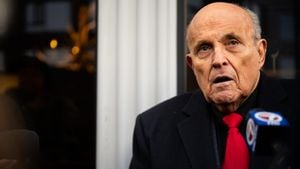Donald Trump has stirred the political pot once again with his recent appointment of Robert F. Kennedy Jr. as the newly nominated U.S. Secretary of Health and Human Services (HHS). This controversial decision has ignited fervent reactions across the political spectrum, especially from Democrats and public health advocates who are alarmed by Kennedy's history as an anti-vaccine activist.
Kennedy, a noted environmental lawyer, gained prominence during the COVID-19 pandemic, primarily through his organization, Children’s Health Defense, which became infamous for questioning the safety and efficacy of vaccines. His entry at the helm of HHS, pending confirmation from the Senate, raises serious concerns about public health policies and the potential rollback of established medical guidelines.
Trump's endorsement of Kennedy has been framed as part of his mission to tackle what he calls the "overwhelming health crisis" facing Americans—a crisis, he states, exacerbated by industrial food suppliers and pharmaceutical companies, which he alleges have engaged in widespread deception about health.
"He’s going to help make America healthy again," Trump asserted during his victory speech at Mar-a-Lago, emphasizing Kennedy's commitment to protect Americans from harmful chemicals, additives, and drugs. The President-elect heralds Kennedy's selection as not just beneficial but as necessary for correcting the course of America’s health policies.
"If confirmed, Kennedy would oversee nearly $1.8 trillion worth of health-related funds, including significant programs like Medicare and Medicaid. His authority would reach far across various public health agencies, including the Centers for Disease Control and Prevention (CDC), the Food and Drug Administration (FDA), and the National Institutes of Health (NIH), the world's largest public funder of medical research," noted sources familiar with the nomination.
Upon accepting his nomination, Kennedy characterized the role as "a generational opportunity" to overhaul U.S. health policies. He expressed intentions to free HHS from the so-called corporate capture, seeking to reintroduce evidence-based practices and routine assessments of vaccines, which he has criticized over purported risks and safety issues.
Health experts, including those from prestigious institutions, have responded with trepidation. Lawrence Gostin, director of the O'Neill Institute for National and Global Health Law at Georgetown University, described the nomination as "the darkest day for public health and science" he has witnessed. He stressed Kennedy’s long-standing distrust of vaccines undermines significant public health victories and could reverse decades of progress.
Kennedy’s controversial stance on various health issues includes repeated claims linking vaccines to autism and asserting there is no vaccine effective and safe enough for public use. Such assertions have led to significant backlash within the scientific community, which cites overwhelming evidence demonstrating the safety and efficacy of vaccines, which have saved millions of lives worldwide.
Further alarm has been raised over Kennedy’s declaration of intent to remove fluoride from drinking water, eliminate "entire departments" within the FDA, and even dismiss hundreds of NIH employees. Such actions are viewed not just as regulatory overreach but as potentially harmful to public health infrastructures aimed at ensuring the safety of medicines and vaccines.
Hawaii Governor Josh Green, himself a physician, voiced emphatic concerns about the nomination during interviews, recounting how Kennedy's anti-vaccine rhetoric contributed to catastrophic public health outcomes, including a measles outbreak tied to misinformation campaigns. Green stated, "If he is confirmed as HHS Secretary, what he will do is he will cast doubt on vaccination programs across America, resulting potentially in millions more opting out of necessary immunizations. The consequences could be devastating with widespread outbreaks of preventable diseases.”
Kennedy’s proposals are set against the backdrop of existing legislative challenges within the Republican party, especially concerning their relations with the pharmaceutical industry. Many GOP lawmakers have pledged to dismantle programs allowing Medicare to negotiate drug prices, fearing such moves could dampen innovation—a financial balancing act Kennedy appears willing to challenge.
On the flip side, some experts have agreed about the merits of Kennedy’s critiques on the "revolving door" incidents between health officials and pharmaceutical companies, where industry insiders frequently transition to governmental roles. Critics argue this has allowed corporate agendas to infiltrate public health decisions, obstructing transparency and accountability.
While Kennedy has publicly decried the roles of certain pharmaceutical practices, apprehensions remain about his proposed overhauls clashing with established medical evidence. Notably, Kennedy has previously prepared to revamp America's health policies significantly, which may either align with valuable reforms or diverge dangerously away from scientifically-supported practices.
Despite his radical proposals forthcoming from the HHS, some health officials remain optimistic about the resilience and continuity of health programs as many agencies maintain bipartisan support regardless of administration changes. The Biomedical Advanced Research and Development Authority (BARDA), which played key roles during the COVID-19 pandemic, is among these with secured backing.
While the confirmation processes are expected to commence, the national conversation surfaces doubts about whether Kennedy’s appointment might lead to relegated trust within evidence-based treatments. Dr. Michael Mendoza, New York’s former public health commissioner, expressed concerns about ideologically influenced decisions affecting vaccine uptake rates as fear and misinformation exacerbate the persistence of skepticism surrounding vaccines.
Outside the U.S., Kennedy’s potential elevations have received international attention, especially from academics across the Atlantic. Some European health officials expressed dismay at what they described as the perceived normalization of vaccine hesitancy—often linked back to Kennedy’s vocal anti-vaccine campaigns. Beate Kampmann, from the London School of Hygiene & Tropical Medicine, stated, "This appointment is potentially catastrophic for public health, risking the hard-won success of immunization programs."
Kennedy’s environmental conservation accolades early on served as the basis for some of his supportive rhetoric, particularly his promise to tackle chronic health issues arising from environmental factors, thereby maintaining public interest. Many await clarification on how these initiatives will reconcile with his anti-vaccine sentiments.
The inclusion of Kennedy within the Trump administration has set off alarm bells both domestically and globally. Health officials and allies of public health measures have called for extensive scrutiny during the nomination process, ensuring transparency and rigor remain at the forefront of U.S. healthcare policy as the nation braces for potential shifts marking newly appointed leadership.
Overall, Trump’s nomination of Robert F. Kennedy Jr. diverts attention to longstanding conflicts between public health advocacy and individual liberties, compounded by the controversial history of vaccine rejection. Experts suggest the ramifications of Kennedy’s tenure—if confirmed—could resonate beyond America, affecting global public health engagements and collaboration on pressing health initiatives.



